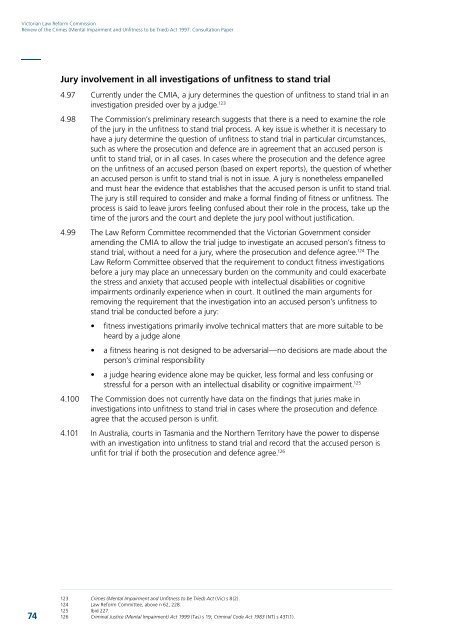Crimes Mental Impairment consultation paper.pdf - Victorian Law ...
Crimes Mental Impairment consultation paper.pdf - Victorian Law ...
Crimes Mental Impairment consultation paper.pdf - Victorian Law ...
Create successful ePaper yourself
Turn your PDF publications into a flip-book with our unique Google optimized e-Paper software.
<strong>Victorian</strong> <strong>Law</strong> Reform Commission<br />
Review of the <strong>Crimes</strong> (<strong>Mental</strong> <strong>Impairment</strong> and Unfitness to be Tried) Act 1997: Consultation Paper<br />
Jury involvement in all investigations of unfitness to stand trial<br />
4.97 Currently under the CMIA, a jury determines the question of unfitness to stand trial in an<br />
investigation presided over by a judge. 123<br />
4.98 The Commission’s preliminary research suggests that there is a need to examine the role<br />
of the jury in the unfitness to stand trial process. A key issue is whether it is necessary to<br />
have a jury determine the question of unfitness to stand trial in particular circumstances,<br />
such as where the prosecution and defence are in agreement that an accused person is<br />
unfit to stand trial, or in all cases. In cases where the prosecution and the defence agree<br />
on the unfitness of an accused person (based on expert reports), the question of whether<br />
an accused person is unfit to stand trial is not in issue. A jury is nonetheless empanelled<br />
and must hear the evidence that establishes that the accused person is unfit to stand trial.<br />
The jury is still required to consider and make a formal finding of fitness or unfitness. The<br />
process is said to leave jurors feeling confused about their role in the process, take up the<br />
time of the jurors and the court and deplete the jury pool without justification.<br />
4.99 The <strong>Law</strong> Reform Committee recommended that the <strong>Victorian</strong> Government consider<br />
amending the CMIA to allow the trial judge to investigate an accused person’s fitness to<br />
stand trial, without a need for a jury, where the prosecution and defence agree. 124 The<br />
<strong>Law</strong> Reform Committee observed that the requirement to conduct fitness investigations<br />
before a jury may place an unnecessary burden on the community and could exacerbate<br />
the stress and anxiety that accused people with intellectual disabilities or cognitive<br />
impairments ordinarily experience when in court. It outlined the main arguments for<br />
removing the requirement that the investigation into an accused person’s unfitness to<br />
stand trial be conducted before a jury:<br />
• fitness investigations primarily involve technical matters that are more suitable to be<br />
heard by a judge alone<br />
• a fitness hearing is not designed to be adversarial—no decisions are made about the<br />
person’s criminal responsibility<br />
• a judge hearing evidence alone may be quicker, less formal and less confusing or<br />
stressful for a person with an intellectual disability or cognitive impairment. 125<br />
4.100 The Commission does not currently have data on the findings that juries make in<br />
investigations into unfitness to stand trial in cases where the prosecution and defence<br />
agree that the accused person is unfit.<br />
4.101 In Australia, courts in Tasmania and the Northern Territory have the power to dispense<br />
with an investigation into unfitness to stand trial and record that the accused person is<br />
unfit for trial if both the prosecution and defence agree. 126<br />
74<br />
123 <strong>Crimes</strong> (<strong>Mental</strong> <strong>Impairment</strong> and Unfitness to be Tried) Act (Vic) s 8(2).<br />
124 <strong>Law</strong> Reform Committee, above n 62, 228.<br />
125 Ibid 227.<br />
126 Criminal Justice (<strong>Mental</strong> <strong>Impairment</strong>) Act 1999 (Tas) s 19; Criminal Code Act 1983 (NT) s 43T(1).

















